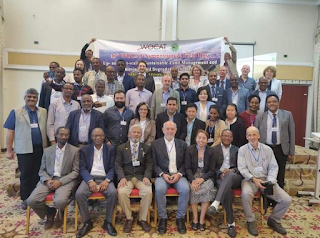The WOCAT Symposium and the 19th WOCAT Network Meeting in Addis Ababa from 13-18 May 2019
19th WOCAT Symposium and
network meeting
(13-18 May 2019)
Addis Ababa Ethiopia
WOCAT network meeting
During the WOCAT Network Meeting invited
WOCAT experts representing different
countries and institutions reflected
on
the achievements and experiences
in applying WOCAT in their respective countries, institutions and projects.
Similarly the meeting participant also discussed on
the future perspective of WOCAT and
looking forward to 2030.
The 19th
WOCAT Network Meeting on 15-16 May 2019 in Addis Ababa, Ethiopia, was dedicated
to the topic of up- and out-scaling Sustainable Land Management (SLM) and
achieving Land Degradation Neutrality (LDN). Capitalizing on 25 years of WOCAT
experiences, partners reflected on achievements, successes and failures and
these reflections will be used for the development of a new WOCAT 2020+
strategy.
Key agreements and recommendations
Based on the discussions
and reflections, WOCAT consortium partners and network members from 18
countries have agreed on the following:
- The unique and vibrant contribution of the WOCAT network for worldwide SLM is undisputed. However, its role and structure require careful rethinking. Therefore, the WOCAT community agrees to embark jointly on a process of adapting the WOCAT network to new opportunities, challenges, and needs, taking into account the recommendations from the external evaluation as well as from the internal assessment.
- There is a need and great potential for
decentralization of the network, building on strong partnerships in many
countries (south-south, inter-institutions, regional clusters or hubs). The
WOCAT community seeks to support this decentralisation process while
strengthening the capacity of the central level to broker
knowledge and collaborations, harmonize tools and methods, and support
synergies, innovations and multi-stakeholder dialogue, actions and processes.
- WOCAT needs to support the creation and
utilisation of synergies between the three Rio conventions plus water and build
capacities towards this end. It needs to engage more in CBD (biodiversity) and
UNFCCC (climate change adaptation and mitigation), and contribute to efforts
towards nature-based solutions and ecosystem-based adaption. The WOCAT
community vows to play a stronger role in supporting countries and regions in
the LDN process and implementation, as well as in linking the three conventions
and water related issues.
- The WOCAT community intends to strengthen further evidence-based decision-making for SLM and to support it by updating and expanding its database on best practices, and by providing and further developing proven decision support tools, methods and approaches. Capacity building efforts to this end should be continued while adapting tools and methods to specific contexts and addressing newly emerging developments.
- Landscape solutions with combinations of
different practices have not sufficiently been explored so far. Even though the
challenges are demanding due to complexity and context specificity, WOCAT needs
to strengthen its focus on landscapes and transboundary contexts - not only
between but also within countries – as well as on land use planning,
integrating all relevant sectors and actors, taking into account multiple
claims on land.
- The inclusion of onsite and offsite impacts
(such as for example floods and water scarcity) into SLM strategies offer great
opportunities to advance the recognition of SLM at different levels, as it
demonstrates that not only the rural population but also urban and peri-urban
people highly depend on good land management. Accordingly, WOCAT needs to
emphasize the link of water to land management.
- Migration of the young generation to urban centres
represents an enormous challenge for the agricultural systems in more remote
and rural regions and for the implementation of SLM. It also leads to the
feminisation of agriculture, thus placing an additional burden on women who
often lack equal access to resources or participation in local decision-making.
Therefore, WOCAT needs to address gender and youth aspects in relation to SLM
by fostering innovations in land management that offer better opportunities for
the youth and women.
- WOCAT needs to strengthen its practical relevance on the ground, demonstrating the added value and benefits of SLM for livelihoods. It should put focus on the socio-economic aspects and impacts of SLM at household, farm and landscape level to provide evidence for scaling out and adoption of good land management at large scale.
- WOCAT should continue its efforts to produce SLM knowledge products that support awareness raising and capacity building on SLM and prove what is at stake in very different contexts if land management is not taken as key priority. WOCAT should conduct more analyses of its large dataset to provide new insights and address key topics related to SLM.


Comments
Post a Comment